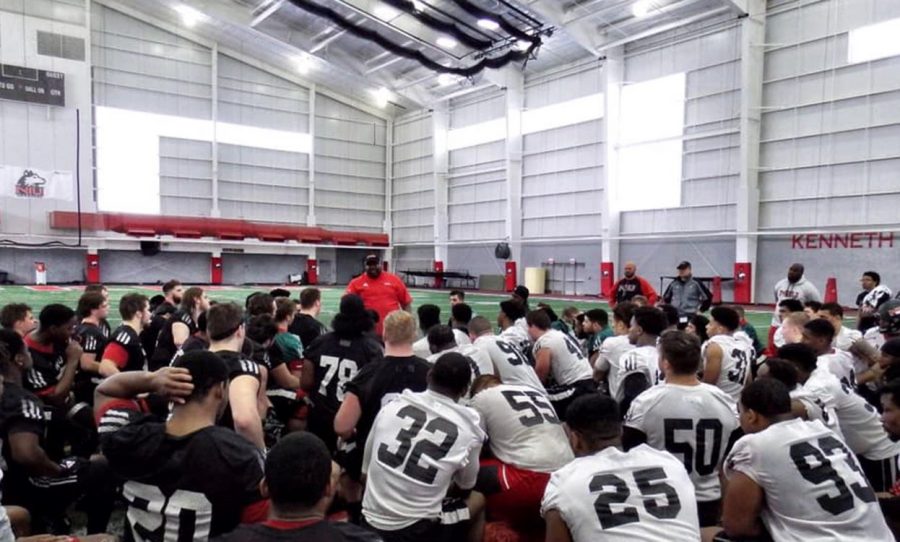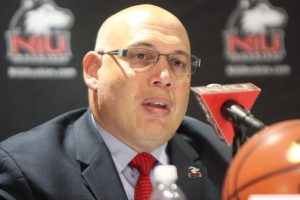Unknowns met with unknowns: why the MAC postponed fall sports and what it means for NIU
August 15, 2020
DeKALB — The postponement of the fall sports season wasn’t something that only came to Athletic Director Sean Frazier’s mind in the days before the Mid-American Conference announced it on Saturday.
Frazier, like many others, has seen COVID-19 affect those close to him. Without disclosing names or relations, Frazier said he’s had people close to him test positive COVID-19 and die. Frazier did disclose that his in-laws had COVID-19 and that the toll the virus took on his home state of New York gave him pause.
“It’s been well documented some of my struggles with COVID,” Frazier said. “My in-laws caught COVID. [I knew] some people perishing. My wife and I have been very private but also public in the sense of the first impact of what happened in our home state of New York, in terms of knowing what was going on and just the loss of life.”
Head Football Coach Thomas Hammock said the decision also didn’t come as a shock to players and staff either. The team was aware of the potential postponement for several days.
“We’ve been continuously transparent,” Hammock said Saturday in a virtual NIU news conference. “We had a few team meetings earlier in the week where I and Mr. Frazier spoke to them and said ‘These are some of the scenarios that may come about over the next couple of days.’”
Both Hammock and Frazier sound depressed when they talk about the decision to postpone the fall season, both due to their long connections to college sports and their disappointment that their student-athletes won’t get to play.
Frazier has been an administrator for college athletics since 1995 when he took his first job at the University of Maine, and said the prospect of college sports not being in his life for a season evokes a lot of emotion from him.
“Obviously the safeguarding of human life is number one on the docket,” Frazier said. “But I’m still human and I’m still emotional that something I love so much and something these kids love so much is being taken away from them.”
Hammock was set to coach in his second season at the very school he once played for as a running back. Hammock said he’s sad his players may miss out on the college football experience.
“Obviously you feel so sad for the young men who’ve put so much into this program,” Hammock said. “I want them to have the same experiences that I had in my career as a student-athlete. You just feel for them and as a head coach I wanted to stand there and be a leader and talk positively about the benefits of the decision that was made.”
It’s the MAC’s decision on Saturday, sparked by concern for health and safety by NIU officials, that could have started a chain reaction throughout college sports. The unknown nature of the COVID-19 pandemic played a key factor in the postponement of fall sports, and is now being met with the unknown of what happens next.
How an NIU decision sparked a discussion in the MAC
The presidents of the MAC met Thursday to finalize their scheduling format for the upcoming season, according to Stadium college football reporter Brett McMurphy. Sources told McMurphy it was at this meeting that NIU President Lisa Freeman indicated to the other presidents that the school would not hold sports in the fall.
Two days later, the presidents voted unanimously on postponing the fall season to the spring. In a Saturday NIU Athletics news release, Freeman applauded the decision.
“I applaud the Mid-American Conference for taking this stance,” Freeman said in the release. “While we all want college athletics to return, prioritizing the health and well-being of everyone involved is the right thing to do. We will continue to rely on medical and public health experts to guide the decision-making process moving forward.”
NIU declined the Northern Star’s request for further comment from Freeman.
Frazier said Freeman’s experience as a researcher and as a medical professional helped inform the decision of the university and ultimately that of others. After earning doctorates in veterinary medicine, Freeman worked as a research scientist at the University of Rochester School of Medicine.
“To have a leader who’s been a researcher and been a scientist who understands this,” Frazier said. “It highlights the seriousness of this is real. Someone who’s gone to school for this, you have to respect the experience level.”
Frazier also cited Freeman’s connections to the medical field beyond NIU, with Freeman’s first position at NIU being four years spent as the vice president of research and graduate studies from 2010 to 2013.
“She has access to her network and her community of other doctors,” Frazier said. “That was really helpful to have those conversations as she leads, and then her going into the room and talking to others.”
Freeman isn’t the MAC’s only president with experience in the medical field. University of Toledo President Gregory Postel is a graduate of Case Western Reserve University School of Medicine and has a residency in radiology and a fellowship in neuroradiology.
The health factors and the decisions effect on finances
“The biggest thing I’m concerned with is with the health and safety of the people we interact with and, quite frankly, with the students themselves,” Frazier said. “We know for a fact we can’t control COVID. We can test but we can’t stop it.”
Prior to reporting to campus for summer camps, student-athletes were tested for COVID-19 as well as being given a COVID-19 risk survey to fill out. Student-athletes and staff weren’t tested every time they entered NIU Athletics facilities, but the university did screen for symptoms and take temperature checks.
For many conferences, including the MAC, it’s the heart condition Myocarditis that’s now being linked to COVID-19 in limited studies and becoming a trend for athletes.
Myocarditis is an inflammation of the middle layer of the heart wall and is typically caused by a viral infection, according to the Mayo Clinic website. The condition could cause long-term symptoms like an irregular heartbeat, heart damage and sudden cardiac arrest.
Big Ten Conference officials are aware of at least ten football players in the conference who have Myocarditis, according to a Tuesday report by Nicole Auerbach of The Athletic.
Frazier cited the hospitalization of Indiana offensive lineman Brady Feeney in an article published by ESPN on Saturday after Feeney’s mother detailed her son’s heart problems after battling COVID-19 on Facebook.
“That’s part of the data that our presidents used,” Frazier told ESPN Saturday. “This mom gave us a play-by-play. That stuff is extremely scary.”
The exact percentage of COVID-19 patients who have contracted Myocarditis as a result of the virus is unknown, as well as how much the heart condition plays a role in deaths from COVID-19 complications. Frazier said he’s alarmed by how much is still unknown about the virus, even with new information being reported.
“Again, we just don’t know,” Frazier said. “Every five minutes there’s new data and now new reports about a heart issue and lung issues as part of the complications. If we have the opportunity to save one person, or atleast fend off any disability related to COVID-19, why wouldn’t we do that?”
The potential damage to the athletic department financially
The toll COVID-19 could take on students and staff member’s health is now being levied on the MAC’s respective athletic departments.
Financial issues are nothing new to NIU. Frazier said the athletic department was able to trim down since 2015 when NIU started the Program Prioritization process to deal with hardships of the Illinois budget impasse.
“It’s a lot of self reflection about our operations that has made us very lean already,” Frazier said. “We’re definitely built for this time. Our leadership has put us in a position to do that, but we understand that we’re going to have to cut again.”
Much like during Program Prioritization, the department is looking at trimming staff and operational costs, which could mean cutbacks from some programs. Frazier said hope still lies in the cuts being less severe if fall sports can still be played in the spring.
“It’s only people and programs right now,” Frazier said. “We’ll probably see some level of further reduction because of no fall sports but not as draconian as if there had been a permanent cancellation. I do expect there will be a further review based on our enrollment numbers and based on other types of things we depend on for revenue.”
The athletic department had already seen a part of their fall sports revenue be lost in the weeks leading up to the postponement. The cancellation of non-conference football games by the Big Ten meant NIU would lose out on $1.1 million they would have earned for playing Iowa University and the University of Maryland.
Frazier said NIU wouldn’t be pulling scholarships for student-athletes affected by the postponement and that academic services the athletic department offers for students will still be made available to them.
“We’re going to be honoring all scholarships and all services for our student athletes,” Frazier said. “This is a one time event. We don’t anticipate any other slow down or stoppages.”
How this season could bring large scale changes to college athletics
In the aftermath of the postponement, other conferences opened dialogues about their own fall sports and if they should continue as scheduled. Several prominent players have stepped up with proposals that could change college sports well beyond this year.
Clemson quarterback Trevor Lawerence and Ohio State quarterback Justin Fields both tweeted out a list of desires for power five conference college football players with the hashtag “#WeWantToPlay”.
One call to action made in the post called for college players being allowed to “use our voice to establish open communication and trust between players and officials: ultimately create a college football players association.”
Frazier, himself a former football player at the University of Alabama, said the student voice needs to be taken into further consideration going forward by individual institutions and the NCAA as a whole.
“The independent voice, the voice of the student athlete, there has to be some type of way we infuse that on a regular basis in a majority of our decision making,” Frazier said. “We’re seeing a reckoning, a consciousness that needs to be pervasive throughout our industry and higher education. The students are the one who need to give their vantage point because the students are the ones taking the most risks.”
Frazier said he didn’t know enough about the proposal of a players association to comment, only adding that officials “should at least listen” to student athletes.
Four of ten Football Bowl Series conferences, including three other programs in the division, will have to try and play their season out to some degree in the spring. Additionally, the NCAA cancelled Division II and Division III fall championships with no immediate plan for them to be played at all.
Details on how the MAC plans to playout their fall sports on the other side of the academic year are sparse, but Frazier said he thinks the idea could work.
“[Student-athletes] want to compete and we want them to compete,” Frazier said. “Spring is that option. In that option you want to provide that level of experience for the student athletes, the community, the fanbase and the institution.”
Hammock said that spring football is “doable” but will need changes to protect players health while still ensuring a 2021 season.
“It has to be modified in some form or fashion,” Hammock said. “There’s no way you can play a full 12 games and come back and play 12 more games. There is a happy medium that can be found.”
While the program remains optimistic, there are still factors and outcomes to this postponement that are still yet to be discovered by student athletes, NIU and the college sports world.
“There’s nothing normal about what’s happening moving forward,” Frazier said. “How do we create an experience moving forward knowing there are so many uncertainties surrounding COVID-19? Those are the things that scare me to death. I still struggle with it now, still not knowing all the short-term and long-term effects of COVID-19.”









